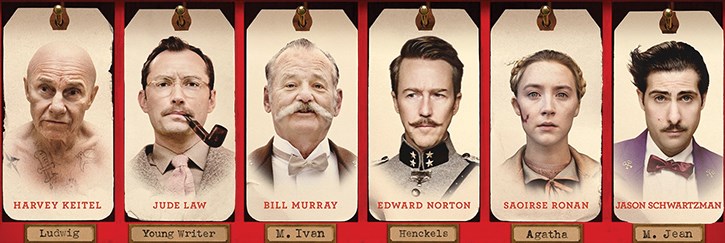Wes Anderson maintains such a remarkable degree of control over his immaculate films that they often seem to unfold in their own hermetically sealed realities. And while The Grand Budapest Hotel is perhaps his most exacting work yet, its narrative is very much informed by real world events, bringing a melancholic air to the often antic comedy.
Employing a structure indebted to well-crafted nesting dolls, Anderson transports us through three distinct eras before depositing us in the fictitious country of Zubrowka in 1932. While fascist forces amass nearby, The Grand Budapest Hotel remains an opulent oasis of civility. Within its candy-coloured walls, concierge Gustave (Fiennes) tends to the guests’ every need, including those of the carnal variety. When his octogenarian paramour (Tilda Swinton, in outrageous makeup) dies under mysterious circumstances, he’s targeted by her malicious son (Adrian Brody) and his henchman (Willem Dafoe), thrusting him into a picaresque caper flick that takes countless deliriously entertaining twists and offers inspired sight gags and sublime dialogue at every turn.
Given Fiennes well-earned reputation for gravitas, it’s remarkable what a nimble comic performer he proves here, foppish in one instant (his cologne of choice is L’Air De Panache) and a fount of anachronistic crudity the next. With Alexandre Desplat’s rousing score demanding that the film operate at a breathless clip, we’re caught just as off-guard as Gustave and his sidekick (Tony Revolori) when their madcap adventures run headlong into the horrors of totalitarianism.
It’s always been evident that Anderson possesses a deft directorial hand. Here he demonstrates that it can also deliver one hell of a sucker punch.
)


